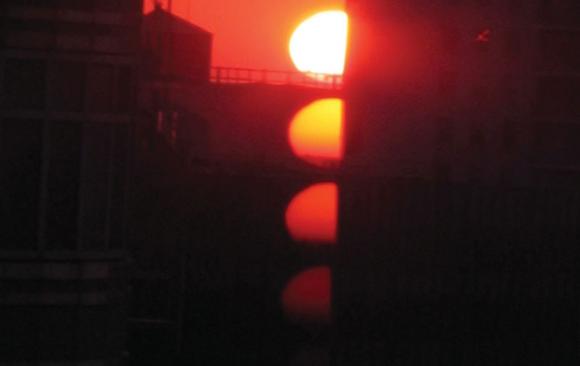


Today temperatures soared above 90 degrees for the third consecutive day, making it the city’s first official heat wave of the year.
Extreme heat is one of the most significant hazards facing New York City, and New Yorkers are especially vulnerable to extreme heat-related hazards during the summer months. Generally, extreme heat is defined by temperatures that hover 10 degrees or more above the average high temperature for the region, last for prolonged periods of time, and are accompanied by high humidity.
On warm summer days, the city can be as much as 10 degrees warmer than its surrounding areas. The city's infrastructure — largely made up of asphalt, concrete and metal — traps the heat. This is known as the "urban heat island" effect.
If you or someone you know cannot stay cool at home, visit a cool place, such as a library, a friend's home with air conditioning or a city cooling center. Cooling centers are open across the city during serious heat waves. You can find a cooling center online or by calling 311.
New York City opens cooling centers in air-conditioned public facilities for those experiencing physical discomfort in a heat wave. Starting yesterday, 160 cooling centers citywide will open from noon to 8 p.m.
To find a cooling center, simply type your address or intersection into the search field on the upper-left corner of the map and then hit "Enter"; or zoom and pan the map to your neighborhood location.
REMEMBER: Stay safe and wear a mask- If you go to a cooling center, wear a face covering and keep physical distance between yourself and other people (i.e., stay at least 6 feet apart).
It seems obvious, but use an air conditioner during hot weather and heat emergencies, even if it is only for a few hours. A setting of 78 degrees F (or low cool) can provide a comfortable environment, help save on electricity bills, and conserve energy. Mayor Bill de Blasio plan to keep New Yorkers safe during the hot summer months. The Cooling Assistance Program provides a limited number of air conditioners for people who meet income criteria and have written letter from a health care provider documenting an increased risk for heat-related illness. For more information, including how to apply, call 311.
“So many seniors who are lower income are suffering. Right now, we need to make sure they are protected against the heat ahead,” de Blasio said.
The mayor introduced what he called “Get Cool NYC” in May after announcing the city’s public pools would remain closed due to health concerns and budget cuts.
“The idea of ‘Get Cool NYC’ is to focus on those who are most vulnerable, make sure they are safe, make sure they are kept cool even with some of the challenges of the coronavirus and even with some of the adjustments we’ve had to make,” he said Thursday.
The plan involves spending $55 million on 74,000 air conditioners for low-income seniors, including 22,000 for people in public housing.
De Blasio said 4,500 have been installed so far, and the goal is to add 1,500 a day.
A participating Heating Ventilation and Air Conditioning (HVAC) vendor list can be obtained by contacting your HEAP Local District Contact. It will be your responsibility to maintain the air conditioner. This includes the responsibility to remove, cover, store, and/or reinstall the unit or the installation sleeve after vendor installation.
You may apply for the HEAP Cooling Assistance with your HEAP Local District Contact.
Pay attention to weather reports on the news, or check National Weather Service reports. The heat index is a measure of how hot it feels based on temperature and humidity. A heat index above 95 degrees F is especially dangerous for older adults and other vulnerable individuals.
COVID-19: Air Conditioning and Open Windows
The virus that causes COVID-19 will not enter your home through an air conditioner or an open window.
The virus is usually spread to people who are in close contact (within about 6 feet) with a person who has COVID-19. It is spread through droplets that are sprayed when a person coughs or sneezes, and possibly when they sing or talk.
If someone with COVID-19 is in your home, opening the windows can increase air circulation. That may help stop the spread of COVID-19 by reducing the amount of virus in the air, but during heat waves, opening windows is not enough to keep cool.
Hot and humid summer weather can cause heat illness and even death. More Americans die from heat waves than all other natural disasters combined. In New York City, more than 80% of heat stroke deaths in recent years involved victims who were exposed to heat in homes without air conditioning. Those most vulnerable to extreme heat include older adults, people with chronic medical conditions or mental health conditions and the socially isolated.
Talk to your doctor about how to prevent heat illness during hot and humid weather. If you don't have a doctor, call 311 to find a doctor or clinic nearby.
Heat illness occurs when the body cannot cool down. The most serious forms of heat illness are heat exhaustion and heat stroke. Heat stroke occurs when the body's temperature rises quickly. It can rapidly lead to death.
Keeping cool can be hard work for the body. This extra stress on the body can also worsen other health conditions such as heart and lung disease.
You won’t lose your power now because you’re having trouble making payments.
If your bill is more than you can pay right now, you may be able to arrange a flexible payment agreement online through My Account on Con Edison's website or you can call them at 1-800-75-CONED (1-800-752-6633). Find more payment help.
Also, according to their website: